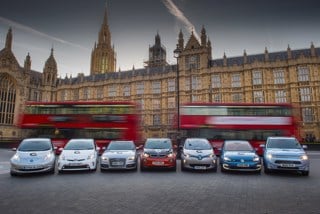Fleets waiting for the Government to rubber-stamp new company car rates may have to wait a little longer with the date of the Budget now in doubt.
Sajid Javid quit his role as chancellor in the middle of a cabinet reshuffle yesterday. He had been asked to fire his team of aides, a request he rejected.
Rishi Sunak, former chief secretary to the Treasury, steps up to become the new chancellor, but a Downing Street spokesman would not confirm whether or not the Budget, scheduled for March 11, would now go ahead as planned. Instead, he would only say that “extensive preparations have already been carried out for the Budget and they will continue at pace".
The fleet industry has already suffered months of uncertainty, waiting for new benefit-in-kind (BIK) tax rates, announced last summer.
On publishing the new rates in July 2019, the Government said it would bring forward legislation to implement them from April 2020.
The legislation was due to be introduced in the Finance Bill, which would have followed an Autumn Budget. However, when the Government lost its working majority in the House of Commons and struggled to push through its Brexit withdrawal agreement, it cancelled the planned Budget on November 6 after winning a vote in the House of Commons to hold a general election on December 12.
The delay created more uncertainty for the fleet industry, with fleet decision-makers and company car drivers not knowing their tax liabilities for future years.
The Budget in March would have allowed the new rates to be adopted into law and, with the passage of the Finance Bill through Parliament expected to go beyond April 6 (when they should become effective), it is understood the legislation would allow them to be backdated.
NEW RATES PUBLISHED
The fleet industry were asked at the start of last year to respond to a series of questions around whether vehicle tax changes were required once the new vehicle emissions testing regime – the Worldwide harmonised Light vehicle Test Procedure (WLTP) – is adopted for tax purposes from April.
It is a pressing issue for fleets as manufacturers say more than 50% of cars they make will see an increase from NEDC-correlated emissions values to WLTP of between 10% and 20%.
For company car drivers and fleet operators choosing a new car from April 2020, this would result in an increased tax liability, compared with an identical model.
HM Treasury published its response to the review in July, which resulted in the binning of the previous BIK rates for 2020/21.
In their place, it unveiled two new BIK tables for company car drivers; a table for those driving a company car registered after April 6, 2020, and one for those driving a company car registered before the same date.
For cars first registered from April 6, 2020, most company car tax rates were due to be reduced by two percentage points, with a new zero percentage rate for pure electric vehicles (EVs).
The zero percentage rate was also extended to EVs registered prior to April 6, 2020, who were already looking forward to a much reduced rate of 2% for 2020/21.
Publishing BIK tables for the next three years, up to April 2023, HM Treasury said rates thereafter would be realigned.
Fleets must now wait to see whether the planned Budget will go-ahead on March 11 or they will face further uncertainty.
























Gary Chippendale - 14/02/2020 11:59
HMRC has already issued some new tax coding notices for the new tax year and a pure EV vehicle has attracted the 2% BIK rate. Hopefully this will be amended in the budget, whenever it happens